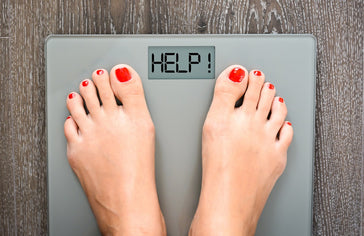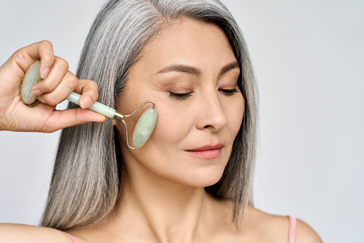Do Probiotics and Prebiotics Result in Weight Loss?
Posted by Mike Miryala on

A lot of people ask, “Can probiotics and prebiotics help me lose weight?” Well, most people have placed their focus on macronutrients alone when it comes to weight loss, and many subscribe to popular diets involving cutting out or down on fat, carbs, or protein. But the truth is that losing weight is more than just regulating our intake of macronutrients.
Most fad diets miss out on the importance of the gut microbiome- the 100 trillion microbes living in our intestine, which play crucial roles in determining whether we’re overweight, underweight, or somewhere in between.
Both the bacteria in the stomach and the foods that promote the growth of these good bacteria in the gut are important for improving our overall health.
However, there are two categories of foods that work to boost the population of healthy bacteria living in the intestine – prebiotics and probiotics.
The key to weight loss is creating an environment that allows the proliferation of diverse strains of good bacteria that will help keep the bad ones in check. So adding these two types of food to your diet offers a lot of benefits, particularly in weight management.
Probiotics for weight loss
Probiotics are preparations of live microorganisms that help to enhance colonies of good bacteria in the gut. Many fermented foods and supplements are rich in probiotics and taking them help to keep the intestinal flora balanced, thereby boosting the digestive and immune system.
These beneficial microorganisms help to break down and digest food. More so, they help increase the bioavailability of vitamins and nutrients for the body to use.
Probiotics feed on fibers, turning them into helpful compounds. But if you have an unhealthy digestive system, it can lead to dysbiosis- which means an imbalance in the gut microbes.
Research shows that that gut dysbiosis may be implicated in development of obesity. A study shows that people living with obesity and people at a healthy weight showed marked differences in their gut microbiota. The study suggests that when you gain weight, there’s a shift in your gut flora.
One research published in the British Journal of Nutrition looked into the effect of Lactobacillus rhamnosus on obese people. The result shows that people who took the probiotics supplement lost more weight than the group that the placebo. The group taking the probiotic supplement continued to experience more weight loss. So, taking probiotics help to boost weight loss and improve overall health.

Types of Probiotics
The most common types of probiotics are from the Bifidobacterium and Lactobacillus groups. These groups contain many different bacteria. The most studied species popular for their health benefits include:
- Lactobacillus bulgaricus
- Lactobacillus acidophilus
- Lactobacillus fermentum
- Lactobacillus gasseri
- Lactobacillus amylovorous
- Lactobacillus rhamnosus
- Bifidobacterium bifidum
- Bifidobacterium longum
The gut contains hundreds of different bacteria species, totally over 100 trillion microbes.
However, certain strains of the lactobacillus family have been shown by studies to help lose weight and belly fat. One study showed that eating yogurt with Lactobacillus amylovorus or Lactobacillus fermentum reduced body fat by 3-4% over a period of 6 weeks.
However, of all the lactobacillus species studied to date, Lactobacillus gasseri has the greatest effect on weight loss. Many studies have shown the anti-obesity effects of this species.
Prebiotics and weight loss
Prebiotics are non-digestible carbohydrates that provide nourishment for the gut microbiota. They are usually present in foods rich in fiber, and they are necessary for creating an ideal environment for the existing good bacteria to thrive.
In simple terms, probiotic cultures feed on prebiotic ingredients. Some rich sources of prebiotic fiber include:
- Dandelion greens
- Jicama
- Asparagus
- Avocado
- Banana
- Cabbage
- Peas
- Potato skins
- Beans and legumes
- Allium vegetables such as onions, garlic, chives, leeks, and scallions
That said, prebiotic fiber help to absorb intestinal fat, making it an effective way to initiate weight loss. Besides, the prebiotic fiber also hinders the absorption of calories into the bloodstream, thereby preventing weight gain.
How do probiotics affect weight changes?
Certain probiotics are thought to inhibit the absorption of dietary fat, thereby raising the amount of excreted fat with feces.
This implies that probiotics make you get fewer calories from the foods you eat. Certain probiotics like the Lactobacillus family are shown to work in this way.
Probiotics can tackle obesity in other ways:
- It may increase the levels of the protein ANGPTL4, and this leads to a decrease in fat storage.
- It may help release GLP-1- the satiety hormone; an increased level of this hormone helps your burn fat and calories.
Many evidence has linked inflammation in the brain to obesity. So by improving gut health with probiotics, you may reduce systemic inflammation, thereby protecting against obesity and other chronic diseases.
However, it is important to note that more research is needed to validate these mechanisms.
How to use probiotics
You can include probiotics in your regular diet in two different ways, including fermented foods and supplements:
Fermented foods
Many foods contain these healthy organisms. Yogurt is one of the best dietary sources of probiotics; it is milk fermented with Lactobacillus or Bifidobacterium strains.
Other types of fermented foods with helpful bacteria include:
- Sauerkraut
- Kefir
- Kimchi
- Kombucha
- Raw apple cider vinegar
- Natto, tempeh, or miso
- Fermented, raw cheeses
Supplements
You can also take probiotics in form of supplements. There are many products available and they typically include Lactobacillus or Bifidobacterium strains. Some products contain both of these strains.

Final Remark
Weight loss is not only achieved by dieting, or adjusting the amounts of carbs, protein, or fat that you consume. You also need to have a healthy gut microbiome.
Probiotics and prebiotics are important to remove unhealthy microbes and keep the good ones, thereby maintaining proper bacterial balance in the gut. You also get to support your intestinal mucus membrane and create microbial diversity needed for proper weight management.

Mike Miryala, Head Pharmacist at CoBionic
You might also like:
Slim Surge
- Clinically tested, Plant based, Weight loss supplement that helps to “block” carbs being digested by the body
- Clinically proven to block glucose absorption by 40% to help lose weight and keep it off
- Made from Mulberry leaves, Reducose® plus 4 more slimming ingredients
- Converts high glycemic index food to low glycemic index food, and reduces insulin spike resulting in higher fat burn
ACV Gummies
- 100% Vegan Gummies with Apple Cider Vinegar, B12, and Folate -- for Improved Digestion, Weight Loss, and Total Body Health
- Controls appetite, stabilizes blood sugar and promotes weight loss
- Improves digestion, eases heartburn and acid reflux








